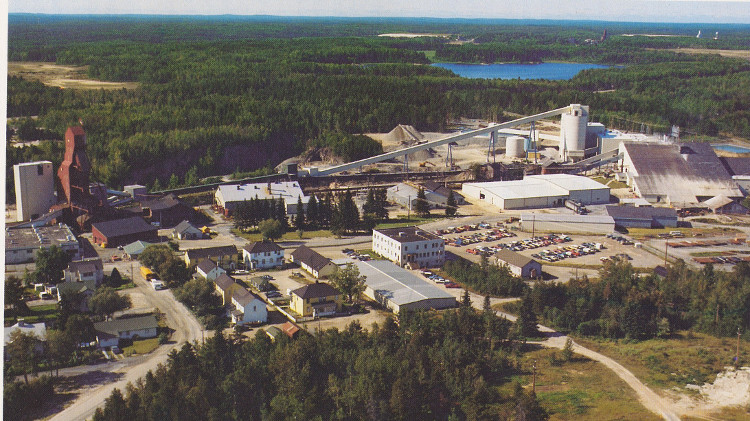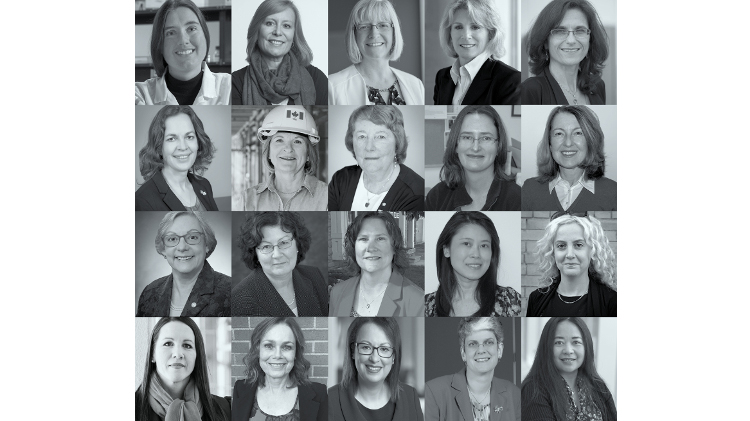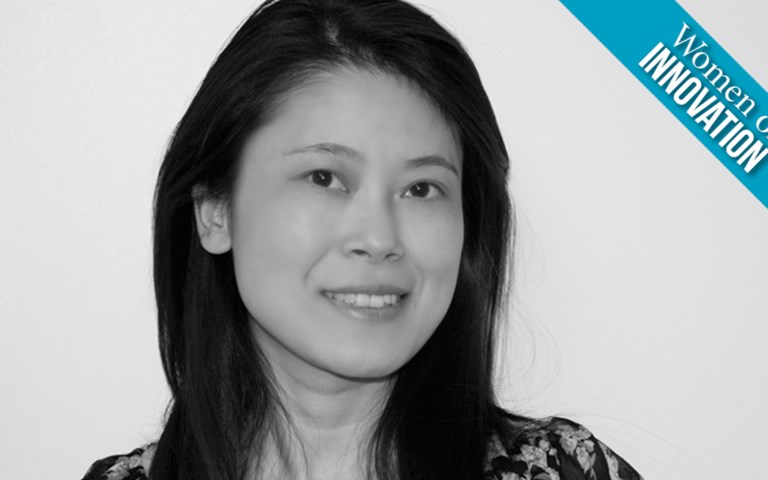Ying Zheng is an award-winning chemical engineer working to efficiently turn biomass into biofuel. Courtesy of Ying Zheng.
Ying Zheng is a professor of chemical engineering and was the 2017 Canada Research Chair in Chemical Processes and Catalysis at the University of New Brunswick (UNB). She is an expert in the field of energy process engineering, more specifically catalytic processes for fuel upgrading and waste-to-energy and value-added products. She has published more than 120 papers and has ten patents to her name, some of which have been licensed or are in the process of being licensed. An accomplished and dedicated professional, Ying is an inspiring and influential role model.
Ying has received a number of honours and awards. For her contributions to chemical engineer, she received the 2010 Syncrude Canada Innovation Award. In 2009, she received the Imperial Oil University Research Award and was named a UNB Research Scholar. In 2014 she was elected a fellow of the Chemical Institute of Canada and in 2016 a fellow of the Canadian Academy of Engineering.
Were you good at math and science from a young age? I love math and physics. It comes to me naturally. I love playing with numbers. It’s fun for me. Your parents are both engineers. Were they supportive of you going into engineering? They were always very supportive. In China, there is a different mindset, there are no stereotypes such as girls going into the arts and boys going into science or engineering. It depends on what you are good at. Your field is selected based on your ability and your future career. If it is a career you want to go into, that you can be successful in and make a good living, then your parents will encourage you to go into it. I really appreciated my parents. They were not typical parents. In China, parents have a lot of plans for their children. My parents listened to me, asking me what I wanted to do and encouraging me to pursue my goals. They trusted me to make good decisions.
Can you describe your experience as an undergraduate student in China? I stayed on campus in a dormitory together with the rest of the students; that is the way in China. You are grouped with others who have chosen similar courses. It is similar to the system in the United Kingdom. For four years, you are with the same group of people together, taking the same courses — you become the best of friends.
Why did you decide to pursue your master’s? I was offered an excellent job because I was the top graduate in my program. At that time, companies were state-owned. You did not need to apply for jobs, the government would recruit the best students to fill available positions at the companies. The top student had privileges. I’m not sure why, but I didn’t want to work; what I wanted was to further my education. There were not many people doing graduate studies at that time. They tended to go to work because there were plenty of very good jobs available.
Did you have any teachers or professors that were particularly encouraging or supportive? My teachers in high school were all very nice. There was only one goal: to get into university. Only ten per cent of students made it to university, so all of the teachers worked really hard to help you reach that goal. They worked with us for more than twelve hours a day, preparing for examinations. They were really supportive of us getting a better education. My university teachers were really supportive of me and encouraged me to do graduate studies, probably because they thought I was good at research. My undergraduate degree was in chemical engineering, which was a little different from the master’s research projects, so I had to take a lot of extra courses. My supervisor was very patient with me. I’ve been lucky to have good teachers in my early career to help build up my knowledge and to encourage me to move forward.
Why did you decide to come to Canada? I got a scholarship from the University of Western Ontario. It opened the door for me, to another career, to another life. My mom and dad weren’t very happy because they worried about me. They had taken care of me all the way until I graduated with my master’s. It was my first time leaving home and it was so far — twelve hours by plane, a different time zone. But I like adventures and I wanted to do something different. I was a little nervous but excited about coming to Canada. I didn’t know the country very well. I knew more about the U.S. because I had a lot of friends getting their education there. I imagined it was similar. It was a challenge but it is a very nice and accepting place. I think of Canada as my home. I have spent half of my life here.
Can you identify a major turning point in your career? When I became a faculty member at the University of New Brunswick. It’s not easy to decide on a final research area, develop technology, and then transfer this technology. There is a long way to go. When I was doing my Ph.D., I was focused on the research topic I had been assigned. When I became an assistant professor, I had to look around, change from an assigned project to looking for a project that is meaningful to me and to society. You have to think about where your research is going. You have to be a leader. I had to get it by myself, find out by myself. I asked, “What kind of assignment do I want to do and how am I going to do it? Why is this important to me, and why is this important to the research community and to society? How am I going to carry it out?” It took a few years to really define the research area that I’m passionate about.
What obstacles have you encountered in your career and how have you overcome them? Initially in Canada, I was very, very shy. My English wasn’t good at the beginning. I didn’t know how to communicate properly. I tried to listen, my understanding was not very good so I forced myself to listen to the radio every day. Challenges are always around you. The biggest challenge is yourself. Everybody is faced with challenges; it’s all in how you approach them. I know it’s difficult, but don’t be too frustrated by failure. In China, we say failure is the mother of success. In my research, for example, we had tested for many years the transformation of biomass to hydrocarbon liquid, transportation fuel. Initially, it was unsuccessful but for years, I kept going. You hang in there, even when you feel hopeless. You believe in yourself and tell yourself, “I’m going to be successful.” It’s important to analyze what went wrong and learn from it and from others’ failures. Then look at someone who is very successful and ask why he or she is successful. You learn from everyone around you — colleagues, students, and others — and try to absorb what you can.
What did it mean to you to become a Canada Research Chair? It’s an honour and more responsibility. The two always go together. Once I became the research chair, I felt that I had the responsibility to do more and to do better, particularly for engineering. You really have to be a role model. It’s the time for me to train more high-quality, employment-ready students and to transfer the knowledge generated in the lab to society, to commercialize it, to put it into the industrial process. That’s what I am doing now and will continue doing.
What factors have contributed to your success? Teamwork and commitment. Teamwork is a critical factor. A good team is essential to carrying out a project successfully.
What factors have motivated you to succeed? My passion. I’m very interested in research. That’s the internal force driving me to continually do the work. I like to create things, make something new. I want to be recognized as an excellent researcher. That’s my desire at the bottom of my heart.
What are you most proud of in your career or where do you feel you have made the biggest impact? When I receive a patent, I am very happy. When I publish a good paper or I earn awards, I am happy. When I transfer technology to an industry process, I am excited. But what makes my heart beep and bump is when my former students talk to me, call me from all over the world, and they say, “Dr. Zheng, I’m making really good progress. I’m doing well in what I’m doing right now.” They have their own successful careers. I really like to see my students growing on their own, becoming strong innovators or researchers, and bringing knowledge through to the next generation. I, myself, can make an impact but if my work or my experience has educated my students, and my students educate others, my impact is multiplied. Educating the new generation is my biggest impact.
What are your current career goals? I wouldn’t leave my research. Research is part of my life but I like to try different things. I want to make a bigger impact.
You have two children - how do you balance work and family? I have a very supportive husband. That really makes a difference. He is always encouraging me. I always make sure that I have enough time with my kids because family is important. I like to spend as much time with them as I can. When you work, it’s mentally intensive. Being with them is quite relaxing. I always say family is the top priority. If you have a supportive and loving family then you have high work efficiency.
Trying to fit it all in is hard. My kids are involved in a lot of activities. I’m the taxi driver taking them to different places. I carry my computer and my work with me when I go. I just work in my car while I’m waiting for them.
Do you feel a responsibility to be a role model for girls and women or to nurture women in your field? I am an educator. I will help everyone, regardless of gender. Anyone willing to work, I will do my best to help them. However, I fully understand it is difficult for a woman to be successful. We have to put in more effort, there is no doubt. If I find female students wanting to do engineering, I always give them more attention and help them. I say, “If I can do it, then they can do it, too.”
How do you view yourself as an innovator? For me, educator comes to mind first — I help students. Innovator comes second. When I am doing research, I work with my students and together we develop new technologies to benefit the community and society. My current research area is the catalytic process. I develop catalysts for clean fuel and then transfer biomass to biofuel. I make a lot of improvements and introduce new technology into this process.
What advice would you give to a young person considering a career in STEM? If you have talent, make sure you use it. Be strong, be confident in yourself, and be persistent. You really have to try. Don’t be afraid of failure. Push yourself.
To read more about Ying and the other Women of Innovation, purchase the book here.
Next: Colleen Legzdins makes waves in wastewater treatment technology
Legzdins develops environmental solutions for the petrochemical industry




